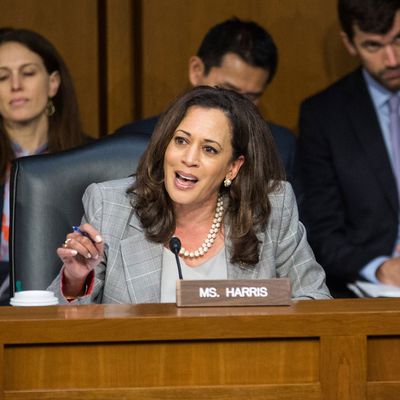
In his testimony before the Senate Intelligence Committee, Attorney General Jeff Sessions did a very evasive thing. Sessions would refuse to answer questions about President Trump, but would not cite any legal basis for this refusal. Instead, he described his refusal as a long-standing “policy” of the Department of Justice. Several Democrats on the committee noted the absurdity of his position, but the most effective interlocutor was California senator Kamala Harris, who, in a brutal exchange, exposed the fact that the “policy” was just made up.
Is the policy is written down, she asked? “I think so,” replied Sessions — an answer lacking the level of legal precision one might hope to get from the federal government’s top attorney. Harris tried to drill down into just how Sessions learned about this policy. Sessions said he had followed a “principle,” which apparently is more of an oral tradition or something. That’s when John McCain, off-camera, jumped in to complain about Harris’s questioning. Sessions was able to run out the clock without explaining just how he learned about the policy he cited for not answering questions.
Harris: And you referred to a long-standing DOJ policy. Can you tell us what policy it is you’re talking about?
Sessions: Well, I think most cabinet people as the witnesses you had before you earlier, those individuals declined to comment. Because we were all about conversations with the president.
Harris: Sir, I’m just asking you about …
Sessions: Because that’s a long-standing policy …
Harris: the DOJ policy you referred to …
Sessions: a policy that goes beyond just the attorney general.
Harris: Is that policy in writing somewhere?
Sessions: I think so.
Harris: So did you not consult it before you came this committee knowing we’d ask questions about it?
Sessions: Well, we talked about it. The policy is based …
Harris: Did you asked that it would be shown to you?
Sessions: The policy is based on the principle that the president …
Harris: Sir, I’m not asking about the principle. I am asking when you knew …
Sessions: Well I am unable to answer the …
Harris: that you would be asked these …
Sessions: question.
Harris: questions and you would rely on that policy.
McCain: Chairman [inaudible].
[thumping noise]
Harris: Did you not ask your staff to show you the policy that would be the basis for your refusing to answer the …
McCain: Chairman, the witness …
Harris: majority of questions that have been asked of you.
McCain: should be allowed to answer the question.
[Sessions laughs. Harris is not amused.]
Chairman Burr: Senators will allow the chair to control the hearing. Senator Harris, let him answer.
Harris [to Sessions]: Please do. [To Burr]: Thank you.
Sessions: We talked about it. And we talked about the real principle at stake is one that I have some appreciation towards, having spent 15 years in the Department of Justice, 12 as United States attorney, and that principle is that the Constitution provides the head of the executive branch certain privileges. And that members — one of them is, confidentiality of communications — and it is improper for agents of any of the departments in the executive branch to waive that privilege without a clear approval …
Harris: Mr. Chairman …
Sessions: of the president.
Harris: I have asked …
Sessions: And that’s the situation we are in.
Harris: Mr. Sessions for a yes or no. Did you ask …
Sessions: Though the answer is yes.
Harris: …your staff to see the policy.
Sessions: I consulted …
Harris: Did you ask your staff to see the policy?
Burr: The senator’s time has expired.
Harris: Apparently not.
Burr: Senator Cornyn.






























